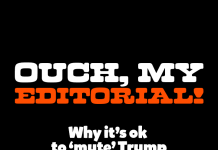Recently I made the epic decision to “Stop the Scrolling!” like I’m some kind of modern day Susan Powter. For a while, I deactivated my Facebook in an effort to not only control my social media habit, but to shield myself from the constant stream of news too painful to hear. We all feel a responsibility to be informed citizens – which, by all means, yes, we should be informed in order to enact caution or change as necessary. But, when that responsibility is continually outweighed by feelings of apprehension or panic, it’s time to take a step back. And, in instances like these, I wholeheartedly believe that self-care should take precedence.
What do you think retweeting does? Sure, it can get you chicken nuggets, but as far as political change goes, it doesn’t amount to a lot. So much of social media is “preaching to the choir;” no one who opposes your school of thought is going to read a tweet and suddenly “get it.” You’re not going to change any opinions with Twitter or Facebook; in fact, all you’re doing by sharing those stories is reinforcing negative thoughts and emotions within yourself and spreading them to others. This anger and disgust is put on a perpetual loop, and you begin to crave it. Do you feel better by sharing this heartbreaking story? Hardly. Negative news appeals to the part of your brain that controls survival instincts, and takes your attention away from what you can rationally act upon. You end up refocusing on the rush you get from being on high alert. Getting yourself so worked up over appalling news items can lead to unclear thinking and unwise decisions.
We tend to think of bad news as more serious, important, or profound.
Psychologically, what we’re doing is falling prey to a few different cognitive biases, most notably negativity bias and confirmation bias.
More activity in the brain occurs when a person is exposed to negative stimuli. Think about this: when you are learning a new task, you must repeat that task to the point of reinforcing that neural sequence in your brain. That particular pathway will become stronger and stronger until you can perform that task flawlessly. Ruminating in negativity reinforces the pathway to anxiety and depression. So, instead of retweeting, channel that energy into actually working for a change. Call your elected officials. Donate blood. Heck, plant a tree.
More often, social media gives you control over your feed by allowing you to customize what pops up in it. For example, in Facebook, you can hide posts from people or groups, and Twitter actually allows you to add certain words or phrases to a “Muted Words” list. They’ll never show up in your feed. You can also turn off retweets from anyone who you follow, so if you’ve become bogged down from someone constantly retweeting takes that turn up your anxiety, you have the power to eliminate those from even being shown to you. And I must emphasize there is absolutely no shame in muting things like “healthcare,” “Russia,” or yes, even the all-encompassing “Trump.” Again, just because you don’t want those political stories in your face 24/7 doesn’t mean you’re ill-informed or embracing ignorance. It’s really a matter of recognizing that those things are contributing to your anxiety or depression, and that removing them in even the slightest way will help you clear up your thinking. Self-care isn’t something to be skimpy about.
So how can you retain focus? Concentrate on what’s happening locally. The threat of a world war – or even more dramatically, the end of civilization – is something news outlets sensationalize to keep you coming back for the latest information. Truth is, none of that exactly matters to your daily life – until it does, and that event is highly unlikely. If you focus on what’s going on in your city – something that you can actually participate in and do something about – you’ll feel gratified and accomplished. In the book Wellbeing, Tom Rath refers to this confidence boost as a “helper’s high,” and typically, what comes along with that is increased feelings of strength, security, energy, and motivation.
Another thing: steady your focus on news stories that are inspiring to you. If we want to discourage news as a culture of fear, we must advocate for media that embraces a culture of courage. Try this: once a day, google “positive news.” There are many articles out there telling stories that rouse good emotions; it’s really a shame that in today’s society we have to actively look for them. One of my favorite positive news outlets comes from the UK, but you can even find a section of Huffpo dedicated to spreading positivity.
If you are suffering from anxiety or depression and you feel overwhelmed, do not feel shame in cutting negativity or toxicity from your life.
I must stress again that, of course, none of this means make yourself ignorant of what’s happening in the world. Keep in mind, you’re not removing yourself from reality – you’re not hiding – you’re solely taking it upon yourself to promote your own personal wellness.
































